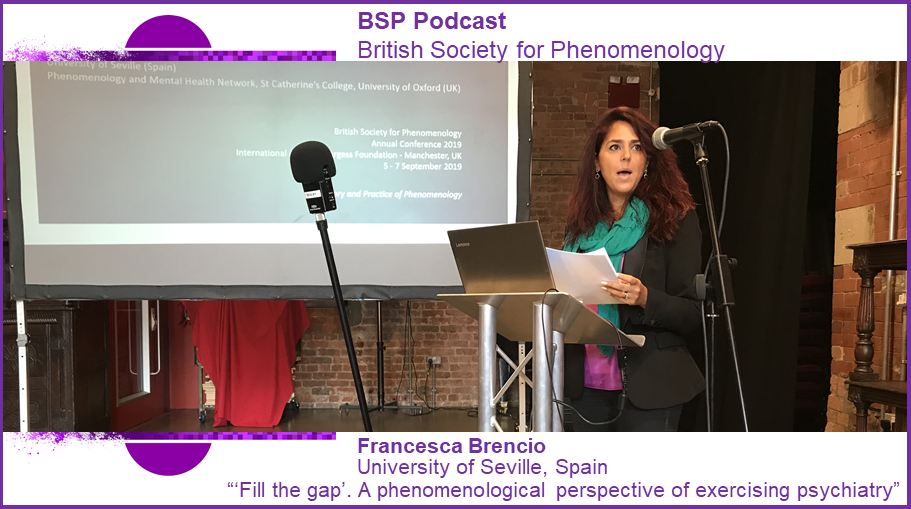Our podcast continues with a presentation from our 2019 summer annual conference in Manchester: ‘The Theory and Practice of Phenomenology’.
Season 4 episode 87: 16 August 2020
Season four of the BSP Podcast continues with a paper from Francesca Brencio, University of Seville, Spain. The recording is taken from our 2019 Annual Conference, ‘The Theory and Practice of Phenomenology’.
Francesca Brencio: ‘“Fill the gap”. A phenomenological perspective of exercising psychiatry’
You can listen to this episode on the BSP’s Podbean site, and you can also find it on iTunes and all good podcasting apps by searching ‘BSP Podcast’.
ABSTRACT: Phenomenology has recently contributed to illuminate medicine and in setting up different theoretical frameworks. The scope of applying phenomenology to healthcare is not to select symptoms in view of a nosographical diagnosis, rather is to recover the underlying characteristic modification that keeps the manifold of phenomena meaningfully interconnected in the life-world of the person. This contribution intends to show how the phenomenological method applied to psychiatry implies a new understanding of psychopathological phenomena, conceived as a coherent way of being in the world, and its peculiarities lie in recovering the underlying characteristic modification that keeps the manifold of phenomena meaningfully interconnected in the life-world of the person, in describing and understanding the inner experience of a human being, of its suffering and also the limitation of its freedom. In doing so, what is required is a radical move away from an “objective” body-orientated psychiatry which is grounded on the idea of fixing something broken instead of understanding why existence itself can collapse and loose its meanings. Advances in philosophy and neuroscience have suggested that mental symptoms are not ‘things’, rather they have a wider, deeper, personal, and cultural sense and a fluidity that may not be reduced to the taxonomy used in relation to the organic dimensions of disorders. Patient’s existence (as well as clinicians’ one) is embodied (physically) and embedded (socially and culturally) and psychopathological phenomena are specific ways of this embodiment and embeddedness. This means that we cannot simply classify them as something that happen to an objective body, a purely physiological condition that is explainable entirely in causal or mechanistic terms. A phenomenologically-informed psychiatry can “fill the gap” between clinical meanings and existential ones and can overcome evidence-based approaches by finding a common language in which words can show relations and not merely signify objects.

BIO: Francesca Brencio (PhD) is Assistant Professor in Philosophy at the Department of Philosophy at the University of Seville, and Member of the Phenomenology and Mental Health Network at the St Catherine’s College (University of Oxford). Her field of research is mainly related to Heidegger Studies, Hermeneutics, Phenomenology, Philosophy of Psychiatry and Philosophy of Religion. She has published in Italian, English, German and Spanish on a wide range of topics, in several collaborative book projects and philosophical and medical journals. She is one of the invited contributors to the The Oxford Handbook of Phenomenological Psychopathology (OUP, 2019).
The ‘British Society for Phenomenology Annual Conference 2019 – the Theory and Practice of Phenomenology’ was held at the International Anthony Burgess Foundation, Manchester, UK, 5 – 7 September, 2019.
Registration is now open for our 2020 annual conference: ‘Engaged Phenomenology’’ – the BSP Annual Conference, with the University of Exeter, co-sponsored by Egenis and the Wellcome Centre for Cultures and Environments of Health. Thursday 3 – Saturday 5 September 2020 (post-event access open until 13 Sept). Free to members of the BSP. Membership £40 waged and £20 unwaged / student / emeritus. When you become a member, you receive paper copies of the Journal of the British Society for Phenomenology (four issues a year), plus access to over 50 years of the JBSP Online. Find out more.
The British Society for Phenomenology is a not-for-profit organisation set up with the intention of promoting research and awareness in the field of Phenomenology and other cognate arms of philosophical thought. Currently, the society accomplishes these aims through its journal, events, and podcast. Why not find out more, join the society, and subscribe to our journal the JBSP?

